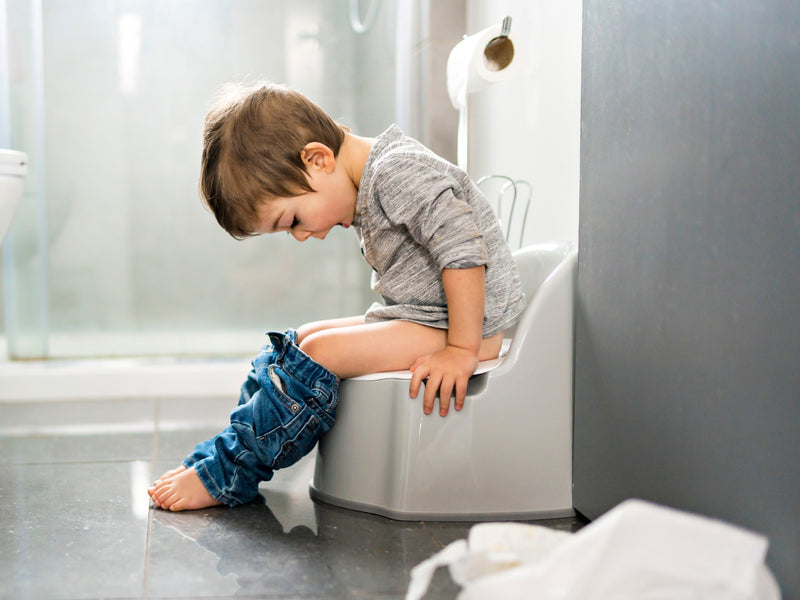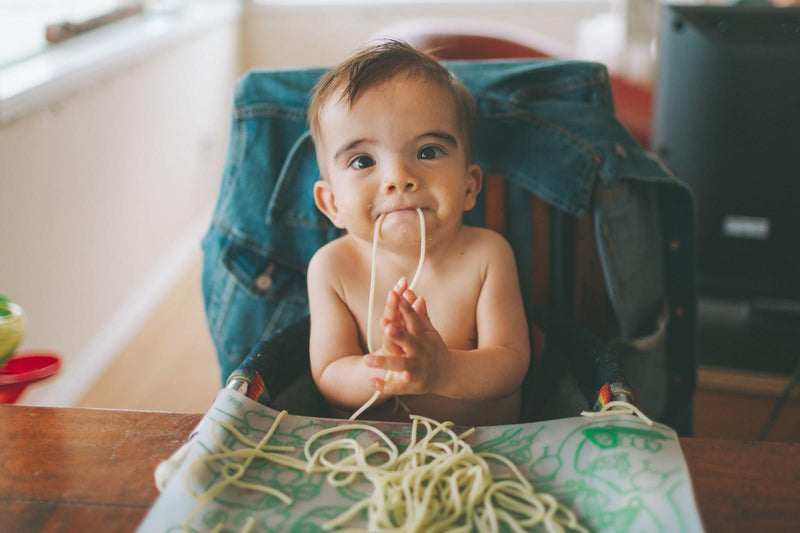
While washing cloth diapers may appear to be a chore at first, there are many advantages that make them worthwhile. In this article, we share the best washing routine and best way to wash cloth diapers. We guarantee that your clothes, linens, and towels won’t smell over time!
How often do you wash cloth diapers?
If it is heavily soiled
The number of times you need to wash cloth diapers varies from 1 to 3 days. If the baby’s diaper is heavily soiled, it should be washed within that one-day period. Then you'll want to wait a week before using that diaper again because you don't want to re-use it too fast.
If it is mildly soiled
If the cloth diaper is lightly soiled and doesn't require much attention, you may wait a couple of days before washing it. Nevertheless, you should not wait more than three days because you risk irreparable staining as well as the formation of bacteria.
The Rule of Thumb
Cloth diapers should be washed frequently enough to keep bacteria, stains, and odor at bay, but not so frequently that the diapers become worn out before you get your money's worth. At the end of the day, it's a matter of personal preference.
You must be able to see and smell a cloth diaper to determine whether it needs to be washed, regardless of how long it has been since it was washed. If it's been a few days since you washed it and it's stained and smelly, rewash it before using it.
How to choose your washable diapers
Can cloth diapers be washed with other clothes?
Separate soiled diapers and diaper covers from your other laundry in a load. You could wash them together but there are two major reasons why it is best to wash them separately.
Diapers get dirtier than clothes
The majority of the time, dirty clothes are only dirty on the outside. Perspiration may occasionally permeate clothing's inner layers, but clothes are typically thin, single-layer pieces of material.
Cloth diapers, on the other hand, are multi-layered, thick items that are designed to absorb liquids (urine) into them. They must therefore be cleaned inside and out. Cloth diapers require an extra rinse at the start of their wash cycle to begin the process of eliminating urine from between the layers of the diaper.
Wash frequency
Dirty clothes can be placed in open laundry hampers, and because they are thin and lightly stained, they dry quickly and can sit for days or even weeks before being washed.
Cloth diapers, on the other hand, are frequently saturated and placed in a wet bag or diaper pail with minimal airflow due to the odor. Mold, mildew, and bacteria thrive in urine that is stored in thick diapers and kept in a closed container. To prevent bacteria and mildew/mold from forming, cloth diapers must be washed every 2-3 days.
Cloth Diapers Vs Disposable Diapers
Is hot or cold water better to wash cloth diapers?
Use your washer's hottest temperature setting. Yes, hot water can damage elasticity, but in the case of diapers, it is the dry heat of the dryer that causes this type of wear and tear. Cloth diaper manufacturers understand that in order to clean diapers successfully, they must be washed forcefully and in hot water, so they make diapers that are durable.
It is strongly advised to avoid washing diapers in cold water during the wash cycle. Cold water is simply insufficient to clean diapers as thoroughly as they should be. You can, however, use cold water in a pre and post rinse. If you use cold water in a pre-rinse, it will help reduce staining. Equally a cold-water post rinse will aid in removing any laundry detergent that could cause a rash to your baby’s sensitive skin.
Is it sanitary to wash cloth diapers in the washer?
This is essentially why you should use the hottest temperature setting. Whilst such a setting would usually ruin your clothes, this will destroy any bacteria or mold that could make your baby’s skin itchy or even make them sick.
The main tip to keeping your washing machine sanitary is to rinse the cloth diaper of any fecal matter before putting it in. You can use a diaper liner or a diaper insert if you can't bear the thought of doing this. These catch the majority of the waste from number twos, resulting in a cleaner diaper.
Helpful products for washing cloth diapers
Which detergent is best for my diapers, and how much should I use? When picking a detergent, the one with the fewest components is generally detergent safe for cloth diapers. Detergents with fabric softeners, enzymes, bleach, or oxygen-based cleansers should be avoided.
These additives are not meant to flush away in the final rinse, which is not what you want when you are washing diapers. The idea is to get the fabric as clean as possible after rinsing. Because you want your diapers to rinse as cleanly as possible, use only 1/4 to 1/2 of the quantity of detergent you would in a usual load of washing.
If your diapers do not get clean in the wash cycle with that reduced amount, gradually increase it until you discover the most effective amount. There are also three natural products many mothers use to avoid detergent chemicals:
Baking Soda: Baking soda is a fantastic cleaner on its own. Because of its pH, it neutralizes scents rather than masking them. If you are having trouble with ammonia odors, baking soda is a great solution to get to the bottom of the problem.
White Vinegar: If you're going to use vinegar, make sure it's in the last rinse of the wash cycle (not the extra or second rinse). Vinegar also helps to balance pH, which aids in the reduction of stinky diapers. It also helps remove detergent build-up from fabrics. However, vinegar can cause stinky diapers so be cautious when using it.
Grapefruit Seed Extract/Essential Oils: Essential oils and Grapefruit Seed Extract have antibacterial qualities that can aid in diaper sanitization. They also smell great, which is a pleasant bonus. Oils and water, on the other hand, do not combine, therefore only a few drops are required!
Laundry detergent for cloth diapers
How to wash cloth diapers?
Here are all the cloth diaper washing instructions you need:
Pre-Rinse
If your baby is exclusively breastfed, their excrement is water soluble and does not need to be removed. It's fine for some to simply dump these dirty diapers into the pail or bag they're using for storage.
You will need to dump, drop, scrape, or spray the solid poops into the toilet before keeping the diaper with the other dirty clothes for formula-fed babies or babies who have had solids introduced into their diets.
Some parents use a diaper sprayer (mini-showerhead-style sprayers that attach to your toilet), while others swish the diaper around in the toilet basin. Even a spray bottle filled with tap water will suffice.
Storage
As mentioned, you only need to wash diapers every 1-3 days. So, what do you do in the meantime before you wash them? If you rinse the diaper, make sure it is still wet (almost dripping) when you put it in with the other filthy diapers that haven't been washed.
The secret to your baby's feces washing out easily and with little to no stains is to keep the diaper moist until washing. Pee diapers can be thrown into the pail without any preparation.
Wash
There are 3 stages to washing cloth diapers. You should aim to wash between 12 to18 diapers at once... any more and they won’t be properly cleaned.
Pre-Rinse
The pre-rinse is used to remove the initial ick from the diaper fibers. A rinse cycle in a washing machine usually lasts 15-30 minutes. This pre-rinse cycle does not require any detergent or chemicals. All that is needed is water.
Wash
To get the diapers clean, use a warm to very hot cycle and cloth-friendly detergent. To give the detergent a boost of potency, add a little scoop of baking soda. Baking soda can also be used to erase protein-based stains and neutralize acidic odors.
If your machine allows for an extra rinse, take advantage of it. It's preferable if the diaper has a lot of water running through it. More water implies a cleaner diaper that is less likely to discolor and leave residue.
Bleach should be avoided at all costs, since it can void any manufacturer warranties. Bleach is a strong chemical that may easily harm clothes if used excessively. Vinegar, like bleach, contains a strong cleaning acid that is sometimes added to laundry loads for the benefit of softer, fresh clothes. However, because the cleaning acids are strong, only a tiny amount of vinegar should be used, if at all.
Fabric softeners should not be used. This includes many well-known baby detergents. Fabric softeners coat the fabric of cloth diapers, causing buildup and preventing ideal absorbency.
Post-Rinse
Most washers only have one rinse cycle per setting by default. We recommend finishing with an extra-rinse cycle. Extra-rinse or 2nd rinse will be the setting on your machine. You will have to manually activate the extra rinse, which will begin as soon as the usual wash cycle is finished. The extra-rinse and final rinse cycles are designed to remove any remaining detergent from the diapers.
How do you dry cloth diapers?
The best way to dry cloth diapers is to hang them out to dry in the sun. It is not always possible for everyone, but it is the best option. The sun kills bacteria with its freshness and provides the best benefits for your baby's bottom. It also helps prevent discoloration.
If you do not have access to a clothesline outside, use one inside your home to dry the diapers. You will not receive the same bright, fresh aroma, but the benefits of line drying will still apply. The biggest advantage is that the cloth diapers will last longer. Simply hang the diapers in such a manner that the elastic is supported, so that the weight of the dampness does not damage the elastic stretch.
Some cloth diapers can be dried on low heat, but this will result in increased wear and tear over time. Waterproof linings, as well as Velcro, buttons, and snaps, may be damaged by using a dryer. Before placing your cloth diapers in the dryer, double-check the drying directions on the product or brand's website. Keep in mind that using a dryer with a higher heat setting can cause the cloth to lose some of its suppleness.




